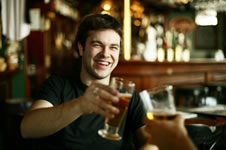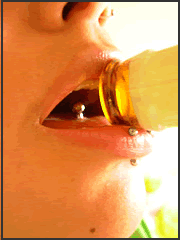Social Benefits of Heavy Drinking Outweigh Harms

iStockphoto
study by University of Washington psychologists shows some people continue to drink heavily because of perceived positive effects, despite experiencing negative effects such as hangovers, fights and regrettable sexual situations.
According to participants in the study, boosts of courage, chattiness and other social benefits of drinking outweigh its harms, which they generally did not consider as strong deterrents.
The findings offer a new direction for programs targeting binge drinking, which tend to limit their focus to avoiding alcohol’s ill effects rather than considering its rewards.
“This study suggest why some people can experience a lot of bad consequences of drinking but not change their behavior,” said Kevin King, co-author and UW assistant professor of psychology.
“People think, ‘It’s not going to happen to me’ or ‘I’ll never drink that much again.’ They do not seem to associate their own heavy drinking with negative consequences,” he said.
The paper was published online May 30 in Psychology of Addictive Behaviors. [continue reading…]
New research from the Kellogg School of Management at Northwestern University suggests losing your inhibitions can lead to positive outcomes – or social misfires
 Power can lead to great acts of altruism, but also corruptive, unethical behavior. Being intoxicated can lead to a first date, or a bar brawl. And the mask of anonymity can encourage one individual to let a stranger know they have toilet paper stuck to their shoe, whereas another may post salacious photos online. What is the common thread between these three disparate states?
Power can lead to great acts of altruism, but also corruptive, unethical behavior. Being intoxicated can lead to a first date, or a bar brawl. And the mask of anonymity can encourage one individual to let a stranger know they have toilet paper stuck to their shoe, whereas another may post salacious photos online. What is the common thread between these three disparate states?
A forthcoming article from the Kellogg School of Management at Northwestern University presents a new model that explains how the diverse domains of power, alcohol intoxication and anonymity produce similarly paradoxical social behaviors – for better or worse.
According to the researchers, all three states work to break down inhibitions in a person, thus triggering the most prominent response in any given situation regardless of the consequences. As a result, alcohol, power, and anonymity can all inspire heroism and hedonism in the same person depending on the context. [continue reading…]

iStockphoto
The BMA reports that doctors have warned that a “significant proportion” of adults are risking alcohol-related health problems.
According to a survey conducted by the BMA in Scotland, on one day in April, alcohol was a factor in more than 5,500 consultations in general practice. This equates to around 1.4 million consultations per year, costing the NHS in excess of £28 million [1] and accounts for six per cent of all GP consultations.
The results of the BMA study, published today (Tuesday 3 May 2011) are based on a sample of 31 practices (3% of the total number of practices) from across Scotland. These practices reported that, on the 21st of April, 169 consultations with a GP or practice nurse had alcohol as a factor.
BMA Scotland is therefore calling on candidates in all the political parties to acknowledge the damaging influence of alcohol misuse on individuals and in communities every day in Scotland and to spend one of the last few days of the election campaign outlining how they will tackle alcohol misuse in the next Scottish Parliament.
In one day:
- alcohol will cost Scotland £97.5 million in terms of health, violence and crime [2].
- alcohol will kill five people.
- 98 people will be admitted to hospital with an alcohol related condition
- 23 people will commit a drink driving offence
- 450 victims of violent crime will perceive their assailant to be under the influence of alcohol. [continue reading…]

Image credit: iStock
Parents who are both present and engaged are the very best way of preventing teenagers from consuming large quantities of alcohol. Adolescents who smoke, stay out with their friends and have access to alcohol – from their parents, for example – when they are as young as 13 are at greater risk of becoming binge drinkers in their late teens, reveals a new thesis from Karolinska Institutet in Sweden.
“Initiatives that focus on strengthening the parent-child relationship and limiting parental provision of alcohol can prove effective in limiting risky consumption among adolescents,” says Anna-Karin Danielsson from the Department of Public Health Sciences. “Parents also play an important role when it comes to teaching young people how to resist peer pressure to drink.”
[continue reading…]



